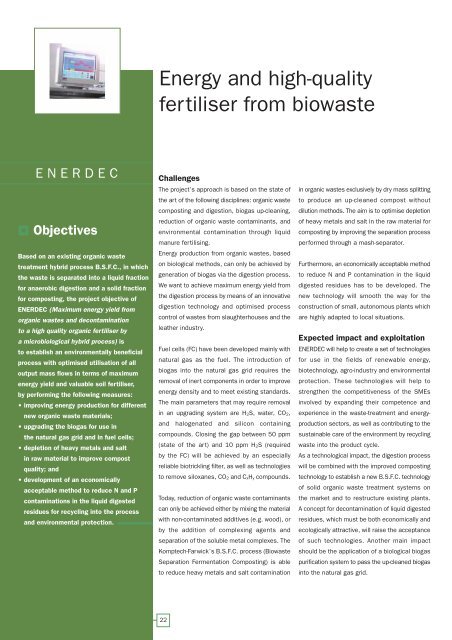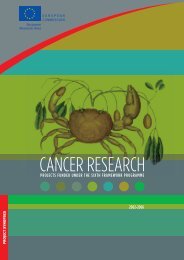European Bio-Energy Projects
European Bio-Energy Projects
European Bio-Energy Projects
You also want an ePaper? Increase the reach of your titles
YUMPU automatically turns print PDFs into web optimized ePapers that Google loves.
ENERDEC Challenges<br />
Objectives<br />
Based on an existing organic waste<br />
treatment hybrid process B.S.F.C., in which<br />
the waste is separated into a liquid fraction<br />
for anaerobic digestion and a solid fraction<br />
for composting, the project objective of<br />
ENERDEC (Maximum energy yield from<br />
organic wastes and decontamination<br />
to a high quality organic fertiliser by<br />
a microbiological hybrid process) is<br />
to establish an environmentally beneficial<br />
process with optimised utilisation of all<br />
output mass flows in terms of maximum<br />
energy yield and valuable soil fertiliser,<br />
by performing the following measures:<br />
• improving energy production for different<br />
new organic waste materials;<br />
• upgrading the biogas for use in<br />
the natural gas grid and in fuel cells;<br />
• depletion of heavy metals and salt<br />
in raw material to improve compost<br />
quality; and<br />
• development of an economically<br />
acceptable method to reduce N and P<br />
contaminations in the liquid digested<br />
residues for recycling into the process<br />
and environmental protection.<br />
<strong>Energy</strong> and high-quality<br />
fertiliser from biowaste<br />
The project’s approach is based on the state of<br />
the art of the following disciplines: organic waste<br />
composting and digestion, biogas up-cleaning,<br />
reduction of organic waste contaminants, and<br />
environmental contamination through liquid<br />
manure fertilising.<br />
<strong>Energy</strong> production from organic wastes, based<br />
on biological methods, can only be achieved by<br />
generation of biogas via the digestion process.<br />
We want to achieve maximum energy yield from<br />
the digestion process by means of an innovative<br />
digestion technology and optimised process<br />
control of wastes from slaughterhouses and the<br />
leather industry.<br />
Fuel cells (FC) have been developed mainly with<br />
natural gas as the fuel. The introduction of<br />
biogas into the natural gas grid requires the<br />
removal of inert components in order to improve<br />
energy density and to meet existing standards.<br />
The main parameters that may require removal<br />
in an upgrading system are H2S, water, CO2,<br />
and halogenated and silicon containing<br />
compounds. Closing the gap between 50 ppm<br />
(state of the art) and 10 ppm H2S (required<br />
by the FC) will be achieved by an especially<br />
reliable biotrickling filter, as well as technologies<br />
to remove siloxanes, CO2 and CxHy compounds.<br />
Today, reduction of organic waste contaminants<br />
can only be achieved either by mixing the material<br />
with non-contaminated additives (e.g. wood), or<br />
by the addition of complexing agents and<br />
separation of the soluble metal complexes. The<br />
Komptech-Farwick`s B.S.F.C. process (<strong>Bio</strong>waste<br />
Separation Fermentation Composting) is able<br />
to reduce heavy metals and salt contamination<br />
22<br />
in organic wastes exclusively by dry mass splitting<br />
to produce an up-cleaned compost without<br />
dilution methods. The aim is to optimise depletion<br />
of heavy metals and salt in the raw material for<br />
composting by improving the separation process<br />
performed through a mash-separator.<br />
Furthermore, an economically acceptable method<br />
to reduce N and P contamination in the liquid<br />
digested residues has to be developed. The<br />
new technology will smooth the way for the<br />
construction of small, autonomous plants which<br />
are highly adapted to local situations.<br />
Expected impact and exploitation<br />
ENERDEC will help to create a set of technologies<br />
for use in the fields of renewable energy,<br />
biotechnology, agro-industry and environmental<br />
protection. These technologies will help to<br />
strengthen the competitiveness of the SMEs<br />
involved by expanding their competence and<br />
experience in the waste-treatment and energyproduction<br />
sectors, as well as contributing to the<br />
sustainable care of the environment by recycling<br />
waste into the product cycle.<br />
As a technological impact, the digestion process<br />
will be combined with the improved composting<br />
technology to establish a new B.S.F.C. technology<br />
of solid organic waste treatment systems on<br />
the market and to restructure existing plants.<br />
A concept for decontamination of liquid digested<br />
residues, which must be both economically and<br />
ecologically attractive, will raise the acceptance<br />
of such technologies. Another main impact<br />
should be the application of a biological biogas<br />
purification system to pass the up-cleaned biogas<br />
into the natural gas grid.

















